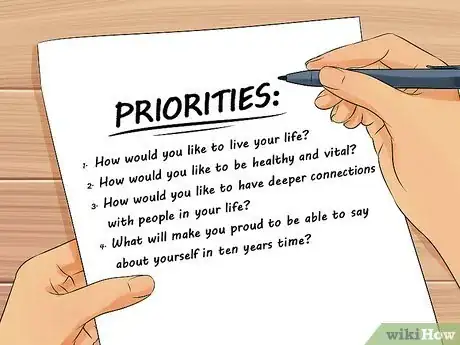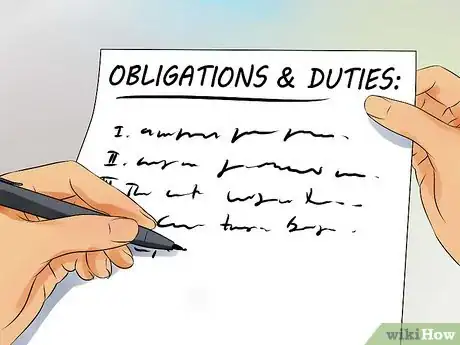This article was co-authored by Trudi Griffin, LPC, MS. Trudi Griffin is a Licensed Professional Counselor in Wisconsin specializing in Addictions and Mental Health. She provides therapy to people who struggle with addictions, mental health, and trauma in community health settings and private practice. She received her MS in Clinical Mental Health Counseling from Marquette University in 2011.
There are 36 references cited in this article, which can be found at the bottom of the page.
This article has been viewed 62,222 times.
Life in today's fast-paced world presents many different sources of stress and strain. Individuals who are confident and capable of dealing with these difficulties are our teachers and role models. There are many things that we can all do to become model citizens ourselves. Understanding how your life is set up currently and developing habits and attitudes that make things run more smoothly will allow you to grow in positive ways. A solid knowledge of the tools to available to deal with life can bring more opportunities and attract other people who are also making a concerted effort to deal with challenges.
Steps
Setting up a Positive Outlook
-
1Accept yourself. Acceptance is a funny thing. The more we truly accept ourselves and our current conditions, the more capable we seem to be of changing for the better.[1] Maybe you're a little bit stubborn, and you know that quality can make life difficult to deal with. Rather than fighting this, acknowledge it and see whether or not you can harness it for use in situations where it is helpful.
- For example, consider how being stubborn is a benefit. Perhaps it means you are a strong advocate for the rights of others. Perhaps it means you don't give in easily to peer pressure. These are good things about being stubborn.
- Consider in what ways your traits are unhelpful. For example, stubbornness can cause you to pursue actions that hurt you or someone else because you won't listen to others. Stubbornness can also mean you refuse to ask for or accept help when you need it, which can end up hurting you in the long run. Identify the areas in which you can modify your traits so that they benefit, rather than harm you.
- Another part of acceptance is having a non-judgmental attitude toward your own thoughts and feelings. Thoughts and feelings simply occur in your life, and are not within your control. What you can control is how you respond to them.[2] For example, if you know you're stubborn and you end up lost on a road-trip, you might experience the thought, "I don't want to ask for help." Acknowledge that your stubbornness is behind this thought, and then decide what action you want to take.
-
2Count your blessings. A little bit of gratitude, well-placed in daily life, can go a very long way. It's easy to fall into the trap of thinking about what's missing or what we still stand to gain in the future. Counting your blessings is good for helping you see what is here now. When we live regretting what we don't have or waiting for more in the future, we deny our needs, joys, and feelings in the present. Looking at and appreciating where you are and what you have will also help you make realistic plans using the skills and resources that are at your disposal.
- Our blessings are not just things outside of ourselves or people we were lucky enough to cross paths with. Blessings are also the achievements we have accomplished. Don't be afraid to look back fondly on your graduation day or the big promotion you received; if you don't carry that spirit forward, who will?
- Try keeping a gratitude journal. Once or twice per week, write down people, experiences, and things that you're grateful for. You could try exploring what your life would be like without them.[3] Studies have shown that keeping a gratitude journal on a regular basis will help you feel happier, more optimistic, and even get better sleep.[4]
- If you're considering people you're grateful for, reaching out to them to share your gratitude in a letter or email can also be a real help. Who knows? You may even inspire gratitude in someone else. Studies have shown that expressing your gratitude for another person can actually make you happier.[5]
Advertisement -
3Turn negative self-talk into encouragement. Do you walk through life telling yourself things like, "This is impossible" or "I can't do this"? Instead of judging and berating yourself for what you think you can't do, remind yourself to look carefully at situations. Affirming and amplifying your strengths will help you find more and more applications for your skills, opening things up to your influence.[6]
- Test the evidence. For example, say you are assigned an exam to take home and, looking at it, you barely understand the question. A voice might pop up that tells you that there's no way you can handle it because you're too dumb to work off the prompt.
- What's your evidence for that assumption? Have you done poorly in the course so far? Have you performed badly on other tests? Are you jumping to conclusions?
- Check for an alternate reality. This doesn't mean you check to see if you're plugged in to the Matrix. It means you look for alternate ways of interpreting the situation. What else could it mean?
- For example, how is the exam written? Is it possible the question is poorly worded? Did you miss a few days of class that might have clarified the question? These examples are more likely than you being "dumb."
- Get some perspective. Test to see whether things really are the way you see them. Is it as bad as you think? What's the worst that could really happen? How likely is that, and how would you be able to handle it?
- For example, say you barely understand this exam question, and you turn in an exam that fails. Does that mean you fail the course? (Probably not.) If so, what would you be able to do?
- Go for the goal. Think about what your goal is in the situation, and whether this thought is helpful. In this case, it definitely isn't. Thinking you're too dumb to answer the question could keep you from even trying. Think about ways you could solve your problem and reach for your goal instead. Could you talk to the teacher about your confusion? Could you study with friends? Could you ask to re-take the exam if you do poorly, or make up your grade with extra credit?
- Search for positive statements to counter the negative ones. Put some thought into thinking about something you truly do well. If you can't think of anything, ask a trusted friend, spouse, or family member to help. Instead of just thinking about the opposite of the negative thought, try thinking about times when you overcame a challenging situation similar to this one. Have you ever felt confused by an exam before? Probably yes. Did you make it through that challenge? Also yes. You can handle this, too.
-
4Drop past resentments.[7] Regrets and resentments block us from being able to handle the present with ease. Think about it; if you are experiencing the emotional turmoil of something that happened years ago, all of your resources for coping are working overtime. Think about the people and situations from the past that still produce strong bodily reactions when you bring them to mind.
- If this was a disheartening situation, try to re-frame it as a learning experience. No matter how painful it was, cultivate acceptance by telling yourself that without that experience, you would not be in a position to learn how to get over major upsets (like you are now).
- Remind yourself that you forgive other people for yourself, not for them. You forgive so that you don't have to carry the burden of anger and resentment through your life. Forgiveness doesn't mean you make excuses for behavior that hurt you; it just means you choose not to dwell on it.[8]
- Acknowledge the harm that was done to cause the resentment. You were hurt, and it's okay to acknowledge that. Then, work to transform your response to that harm. Instead of holding on to the pain, acknowledge that it was part of your experience, but you don't have to continue to take it with you.[9]
- Make amends with people who represent a strong lack of resolution in your life. This might be a parent you haven't seen in years or a friend who you never saw after a fight. You don't have to initiate a long confrontation about whatever happened, but it is important to let this person know that you have recognized unresolved issues related to them, and that you intend to move forward in your life with respect for them and gratitude for the lessons of your shared experience. Email or other forms of written messages are good mediums.[10]
-
5Keep positive influences close. Positive influences are people who you feel you can be yourself around, above all. They help you feel comfortable in your skin by making you feel that life always has more to offer, even if things seem dreary and unmanageable. Make sure you surround yourself with others who have similar values when it comes to dealing with life. Studies show that people who feel socially and emotionally supported are happier and healthier than people who don't.[11]
- Humans also are prone to "emotional contagion," where the emotions and moods of one person "rub off" on those around them.[12] Even one highly negative person can make a whole group of people feel more upset and negative themselves. Conversely, positive people can make a positive difference in the feelings of those around them.
- If you have a colleague or friend who consistently gives you the feeling that, say, this work assignment isn't really that difficult, or that the time you got lost and showed up late was kind of a fun adventure, stick by 'em! These are the people who help you re-charge--they help you find your inner stores of energy rather than depleting them with droll conversation.
-
6Take life a little less seriously.[13] Much of the time that life feels difficult to deal with, it is because we are putting ourselves to the task of dealing. We want to dedicate ourselves to the serious problems in our lives that need handling, so we overgeneralize this sense of concern and treat many situations as if they are big problems or liabilities. This is the sort of thinking that makes us criticize others, work too hard to correct minute errors and issues we see around us, and fail to "take the bait" when others make jokes.
- Try to see the silly side of everything that happens.[14] When you find yourself getting riled up about, for example, a portion of burnt cheese on the pizza you ordered, imagine that you are in a cartoon and your ears have just started fuming. See that you're putting on a performance that you have the opportunity to laugh at, too.
Coping with Stress
-
1Know your triggers. If you know what situations make you overly stressed and never seem to get easier, you can avoid them more easily. An awareness of the things, people, and places that trigger your stress will provide you more choice and help you flex your muscles for developing alternatives that work better for you personally.[15]
- There are basically two types of stress: acute stress, which is immediate and pretty intense, and chronic stress. You experience acute stress when you ask a crush out, you're pulled over for speeding, or having your first job interview. It can be very uncomfortable, but it usually doesn't last very long. Chronic stress occurs when you have a lot of stress piling up on you, and it doesn't tend to go away. For example, if you're in a job that you hate, you're trying to balance your work, family, and school, or you live in poverty, you're likely to experience chronic stress. This type of stress can cause serious health issues.
- Say you have a friend who always stresses you out to be around. You like this person, but every time you spend time together it leaves you feeling short, unnerved, and defensive. Is it because he always takes you to places you don't fit in? Does he encourage you to try things you're not interested in? Look at these details and be prepared to negotiate changes to where and what you do together. You may also choose to reconsider this friendship and the value it has for you.
- Alternately, if your stress is caused by something unavoidable like an exam that you are nervous about or an uncomfortable obligation to your family, you can prepare yourself mentally.
- Tell yourself that it is a passing scenario that will be over soon enough. Reminding yourself that you are capable of handling this temporary situation with grace will also put you in a more optimistic place. Imagine yourself moving through it with ease.
-
2Learn how to relax. Stress is just as much in our minds as it is in our bodies, and there are many ways to relax your body through natural means. Many studies have shown that relaxation is critical to managing stress and living a healthy, happy life.[16]
- Massages and baths are both good relaxation tools because hot water and soothing touch sends the "relax" message to our bodies much more quickly than simple stillness. Physical touch, light pressure, and warm temperatures help your body release oxytocin, a hormone that signals your body to relax.[17]
- Essential oils and aromatherapy can help enhance psychological and physical well-being, and can be used for massages and baths. Good choices for relaxation include lavender, rose, and patchouli.[18]
- Research has shown that soothing music can also be helpful way to calm down and decrease stress.[19] Make sure you choose whatever helps you let go.
- You can also try Progressive Muscle Relaxation, deep breathing exercises, self-hypnosis, and visualization exercises.
-
3Drop ideals and unrealistic expectations.[20] One major block to dealing with life's hurdles are the expectations that we carry around with us. Of course all salespeople should be honest and all of our friends should be available to listen whenever we need them, right? Not entirely. The more specific our hopes are for how things should be or how certain events should turn out, the more we set ourselves up for frustration and disappointment. We tend to either try to regain control and try to change things that we cannot or recoil into feelings of failure.
- Try to maintain an attitude of acceptance for what comes to you. Plan the absolutely crucial things, but don't expect the world to cater to your mission. Allow yourself to be surprised and alert to shifts and changes, as small as an unexpected rainstorm on the day you had planned to garden or as large as a breakup with a partner you thought had lots of potential.[21]
- This attitude requires two things: trust in your ability to bounce back and respond to the unexpected occurrence and faith that everything happens in order to teach you something. If you're thrown curve balls, no matter how annoying they may be to deal with, you'll be even better at catching them in the future.
-
4Let go of the little things. We are often confronted with inconveniences and dissatisfaction that a little distance shows us are not very important. As human beings, our needs in life are surprisingly basic (physical necessities, positive emotions, and a sense of meaning mostly cover them).[22] We get frustrated when we confuse our needs with the strategies we normally use to fulfill them.[23]
- For example, say your need for deep engagement with something is habitually fulfilled by a pottery class. If the class gets cancelled, it doesn't mean that your need can't be met. It simply means that one possible strategy you use to meet that need is not available right now. Instead of getting angry, find another way to engage deeply, like reading or cooking.
-
5Choose your battles wisely. Recognize when the little things get in the way of your relationships with others. Think deeply about your priorities before picking a fight, making an accusation, or launching a judgment that you know will rile feathers. Ask yourself if and why you want to create another situation that will have to be dealt with. Is whatever is peeving you worth it?
- We often lash out at others when there is something that we could deal with perfectly well on our own.[24] By changing your outlook and re-framing the situation, you can deal on your own without having to bring extra complication and hurt feelings into the mix.
-
6Block off some "you" time. Make checking in with yourself and your priorities a regular occurrence. Take time on your own to refresh and recharge. This will help you become more comfortable with yourself, more confident in your ideas, and even more productive when you "resurface."[25]
- The more time by yourself spent outside, the better. When possible, spend your alone time in the backyard or at a nearby park. This will make it so you have fewer reminders of the duties and material things we often get caught up worrying about and more reminders of beauty to be appreciated. Spending time in the great outdoors can also promote your sense of awe and wonder, which has been shown by studies to make you feel happier and more optimistic.[26]
-
7Exercise to manage adrenaline. Exercise causes your brain to release endorphins, adrenaline, and other chemicals that uplift mood.[27] When these chemicals, especially adrenaline, are not intentionally released they can cause excess stress and strain on your body. Movement of all kind has been proven to regulate bodily functions and advance emotional well-being. Try getting into an activity that suits your lifestyle. Yoga, weight training, and cardiovascular exercise all offer different, but equally helpful ways to release energy before it turns into nervousness.[28]
- Consider how much physical activity you already have in your life and choose accordingly. Also, try to take stock of how much energy you tend to carry. Grinding your teeth, fidgeting, and pacing are all signs that you may want to pursue a decent amount of exercise.
- Remember that the goal is to deal with life, not to add more obligations and sources of stress. Avoid committing to a movement regimen that isn't feasible in light of everything else you have going on.
Developing Life-Affirming Habits
-
1Use to-do lists on busy days. When we have tons of things to do, organization helps lessen the overwhelm and creates some order out of chaos.[29] Having a visual sense of what you need to do will serve as a reminder that you are capable of getting everything done. What's more, you are able to see how much room you have to be more flexible about what you do. This is helpful because it can be easy to slip into a mode of frantic activity, causing extra stress, even if time permits you to slow down a bit.
- It can also help to order items on your to-do list by urgency. On the days that you can't get to everything despite your best efforts, you can still rest comfortably knowing that your time-sensitive responsibilities (like paying bills or caring for a pet) are covered.
-
2Maintain an inspiring environment.[30] Having a clean, open, and well-designed space at home, work, etc., can invigorate you to take on more fulfilling activities. You don't have to be a designer to set up a nice space. Think about it: most of us already exercise design skills already from setting up our desktops, social media pages, etc.
- Try to have a spring cleaning overhaul at least a few times throughout the year. Remember that, psychologically speaking, removing clutter and unused items is just as important as cleaning dirt and grime.[31]
- Do the same with your digital devices. Deleting old emails and contacts provides us with the same feeling of open space that cleaning our living space does. Clearing space is a way to invite in new opportunities.
-
3Get solid nights of sleep. Research tells us that after just a couple nights of shortened sleep, many people experience moodiness and diminished ability to regulate negative emotions--especially for young people.[32] . If poor sleep habits strike down the positive outlook you aim for, everything becomes hard to deal with again.
- If getting the recommended 7-8 hours of sleep does not fit your lifestyle, try to make time for power naps. These quick naps can go a surprisingly long way in giving you the energy you need for dealing with the rest of the day.
- Try to go to bed and get up at the same time every day, even on the weekends.[33]
- Turn off screens at least an hour before bed. Switch off the TV, shut down your laptop, turn off your tablet. Read a book or listen to soothing music to get your body in the mood for sleep.[34]
-
4Eat according to your needs. Life is dealt with more effectively when our basic need for nourishment is not a source of doubt or worry. Make sure that you are aware of the nutrients that you need and what sorts of foods your body needs to function smoothly. If you notice that you are often hungry (or on the other side of the spectrum, weighed down) throughout the day, consider revamping your diet.
- Make a list of basic items to always have in stock. If you can stick to your list, it will never be too difficult to prepare a quick meal or healthy snack. By having reliable options, you will also avoid the over- and under-eating that normal come along with (and worsen) stress.
- You don't need to be a culinary mastermind to eat well--just stable habits for when you go grocery shopping and prepare meals.
-
5Cultivate openness with others. A full life with a disparate group of peers, colleagues, and family members creates the need for open communication. When we are not afraid to have the difficult discussions that clarify our thoughts and feelings, dealing with others becomes a piece of cake.
- Are there issues you'd like to bring up with others? Try not to push these aside out of fear of conflict. Oftentimes there are simple fixes that will help you work through differences productively.
- For example, you might have a co-worker who always leaves you responsible for your least favorite task, filing papers. If you calmly let your co-worker know that filing papers is a major source of upset for you, you could work out a way to share the burden. Perhaps your co-worker simply forgets to file papers and doesn't mind taking on the task entirely. Either way, you'll feel empowered for making an adjustment that frees up more time for enjoyable activities.
- When you approach others, use "I" statements that focus on feelings rather than "you" statements that frame things as fact. For example, you could say "When we have papers that don't get filed, I feel stressed out. I'd feel less overwhelmed if you would help me file things from time to time. What do you think?" This is not accusatory or judgmental, but it does convey your need clearly.
Understanding Your Life
-
1Discover your priorities. Spend time thinking about your priorities, separate from the obligations and duties that must be dealt with.[35] Take note of the happiest moments in your life, and prioritize the current facets of your life that deliver more moments like these to you. Remember, you don’t need to think about the practical side of things yet. Just focus on what truly makes you tick. Doing this will help you connect with what you care about deeply and what you do not. Keep the list short and sweet—no longer than five things. Ask yourself the following questions in order to connect with your priorities:
- How would you like to live your life?
- How would you like to be healthy and vital?
- How would you like to have deeper connections with people in your life?
- What will make you proud to be able to say about yourself in ten years time?
-
2List your obligations and duties. These obligations might be survival necessities, like paying rent and buying groceries, or they might be things that others expect from you, like time and affection. What are the things that you do in attempts to avoid emotional or physical punishment? What do you do out of care and a sense of responsibility? Recognizing what you do out of fear for the alternative will sharpen your ability to see when you are acting from a priority and when you are acting out of fear, urgency or obligation.[36]
- Slowly, you'll learn to make different decisions about what needs to be dealt with and when. Allow yourself to prioritize the things that you do from an internal, joyous sense of responsibility so that you don't get too bogged down to realize if the things that you care about most begin to suffer from neglect.
- Begin to notice which obligations can be altered, split, or delegated in order for your values and priorities to be upheld. Can an aunt, friend, or coworker help out with the obligation some of the time? Maybe some of these obligations are not really yours to uphold at all.
-
3Think about your relationships. To live without getting overwhelmed or confused about what your priorities are, it is crucial to surround yourself with people who make you feel comfortable enough to be confident and creative.[37] When you are around others, try to be extra mindful of the people who make you feel alive and alert and who makes spending time feel like a chore. This will bring out your gut feelings about whose presence really nourishes you, making it easier to spend your time feeling uplifted rather than drowning in unsatisfying social obligations.
- Ask yourself questions, like “Do I feel valuable around this person?" and "Who makes my contributions seem silly?” The answers might be surprising.
-
4Become aware of your vices. Do you drink, smoke, or zone out to the television frequently? Awareness of your vices is important not because you should punish yourself for them, but so that you can understand how you deal with life already.
- By becoming aware of the roles your vices play in your life you can learn how to use them responsibly without making them forbidden fruit.
- Recognize when you turn to them and notice how the frequency of your use ebbs and flows with changing circumstances.
- For example, if you go out partying to relax, begin to see this as just one of many tools that you use to deal with life. As long as it's not your only one, you will have the control to realize when it's a useful option and when you might want to use another tool, such as meditation or yoga.
-
5Imagine the best version of yourself. What are your most important qualities? Understanding the gifts you can offer the world can help you see the things that are worth dealing with and the things that you can leave behind.[38] Take a few hours to think deeply about what makes you special so that you can better orient yourself to your real priorities.
- Spend time in a place where you can reflect. Try going to your favorite place in nature, or spending time near people who understand and accept you. When you can really be yourself, what qualities emerge?
- It may also help to ask people you trust what good qualities they see in you. We are often our own worst critics and have trouble seeing our strengths on our own.
References
- ↑ http://psychcentral.com/lib/therapists-spill-12-ways-to-accept-yourself/
- ↑ http://www.scientificamerican.com/article/can-we-control-our-thoughts/
- ↑ http://greatergood.berkeley.edu/article/item/tips_for_keeping_a_gratitude_journal
- ↑ Emmons, R. A., & McCullough, M. E. (2003). Counting blessings versus burdens: An experimental investigation of gratitude and subjective well-being in daily life. Journal of Personality and Social Psychology, 84(2), 377-389.
- ↑ Seligman, M. E., Steen, T. A., Park, N., & Peterson, C. (2005). Positive psychology progress: empirical validation of interventions. American Psychologist, 60(5), 410.
- ↑ http://psychcentral.com/lib/challenging-negative-self-talk/
- ↑ http://psychcentral.com/lib/therapists-spill-12-ways-to-accept-yourself/
- ↑ http://www.mayoclinic.org/healthy-lifestyle/adult-health/in-depth/forgiveness/art-20047692
- ↑ http://greatergood.berkeley.edu/article/item/what_is_forgiveness
- ↑ http://greatergood.berkeley.edu/article/item/nine_steps_to_forgiveness//
- ↑ http://www.ncbi.nlm.nih.gov/pmc/articles/PMC2729718/
- ↑ https://journals.sagepub.com/doi/abs/10.2307/3094912
- ↑ http://www.selfgrowth.com/article/For_Those_Who_Take_Life_Too_Seriously.html
- ↑ https://www.psychologytoday.com/blog/happiness-purpose/201309/lighten-and-laugh
- ↑ http://www.mayoclinic.org/healthy-lifestyle/stress-management/in-depth/stress-management/art-20044151
- ↑ https://nccih.nih.gov/health/stress/relaxation.htm
- ↑ http://www.ncbi.nlm.nih.gov/pubmed/9401603
- ↑ http://www.ncbi.nlm.nih.gov/pubmed/22612017
- ↑ http://www.ncbi.nlm.nih.gov/pubmed/25584730
- ↑ https://www.psychologytoday.com/blog/happiness-in-world/201003/the-danger-having-unrealistic-expectations
- ↑ http://www.anxietybc.com/sites/default/files/ToleratingUncertainty.pdf
- ↑ http://www.simplypsychology.org/maslow.html
- ↑ http://www.cnvc.org/Training/needs-inventory
- ↑ https://www.psychologytoday.com/articles/200509/learning-not-lash-out
- ↑ https://www.psychologytoday.com/blog/high-octane-women/201201/6-reasons-you-should-spend-more-time-alone
- ↑ http://greatergood.berkeley.edu/article/item/awe_boosts_health
- ↑ http://www.nhs.uk/conditions/stress-anxiety-depression/pages/run-to-boost-mood.aspx
- ↑ http://www.dartmouth.edu/~eap/Healthy%20Exchange%20PDFSummer%2008.pdf
- ↑ http://www.psychologicalscience.org/index.php/news/the-psychology-of-the-to-do-list.html
- ↑ https://www.psychologytoday.com/blog/the-new-you/201504/the-psychology-spring-cleaning
- ↑ http://www.wsj.com/articles/the-psychology-of-clutter-1404772636
- ↑ Baum, K. T., Desai, A., Field, J., Miller, L. E., Rausch, J. and Beebe, D. W. (2014), Sleep restriction worsens mood and emotion regulation in adolescents. Journal of Child Psychology and Psychiatry, 55: 180–190.
- ↑ http://www.mayoclinic.org/healthy-lifestyle/adult-health/in-depth/sleep/art-20048379
- ↑ http://www.mayoclinic.org/healthy-lifestyle/adult-health/in-depth/sleep/art-20048379
- ↑ http://www.selfcounseling.com/help/personalsuccess/personalvalues.html
- ↑ https://www.jstor.org/stable/1519843?seq=1
- ↑ http://www.mindtools.com/selfconf.html
- ↑ Sheldon, K., Lyubomirsky, S.(2006) How to increase and sustain positive emotion: The effects of expressing gratitude and visualizing best possible selves. The Journal of Positive Psychology (2)1.




















































































